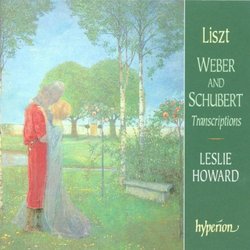| All Artists: Franz Liszt, Leslie Howard Title: Liszt: Weber & Schubert Transcriptions Members Wishing: 0 Total Copies: 0 Label: Hyperion UK Release Date: 4/14/1998 Album Type: Import Genre: Classical Styles: Chamber Music, Historical Periods, Classical (c.1770-1830) Number of Discs: 1 SwapaCD Credits: 1 UPC: 034571172033 |
Search - Franz Liszt, Leslie Howard :: Liszt: Weber & Schubert Transcriptions
 | Franz Liszt, Leslie Howard Liszt: Weber & Schubert Transcriptions Genre: Classical
|
Larger Image |
CD Details |
CD ReviewsLiszt the Editor Hexameron | 06/08/2007 (5 out of 5 stars) "Liszt's adoration for Schubert and Weber was perfectly genuine. The astounding amount of piano transcriptions Liszt created after Schubert's lieder is testimony to that fact. Leslie Howard has recorded every Schubert transcription, producing a total of 9 discs of Schubert-Liszt. Weber, however, has only occasionally popped up in the Liszt at the Opera series or the Beethoven/Hummel Septet transcriptions, where Liszt's piano transcription of Weber's "Lyre and Sword" is presented. So how is this volume different? With the exception of the 1837 intermediate version of Schubert's "Die Rose," the other Schubert pieces here are the labors of Liszt's editing. Liszt makes minute changes and essentially edits the music for the purpose of making these works easier to play in his own published editions (it should be noted that he did this in the interest of exposing the music he loved to the public). And of course, this recording offers a stupendous trio of Weber transcriptions.
Liszt's, but perhaps more substantially, Howard's efforts with Schubert's Wanderer Fantasie is unbelievably first-class. If there is a top-five ranking of Wanderer Fantasy performances, I have no compunction about placing Howard in such a high rank. Endless paragraphs could be written in praise of Schubert's phenomenal piano composition, but I'll let Howard explain Liszt's edition of this work: "Schubert's text is presented with many an alternative suggestion for the first three movements, either to replace some of Schubert's less pianistic textures (it must be remembered that at the time practically everybody, from Schubert onwards, declared the work unpianistic and unplayable as it stood) or take advantage of the greater compass of the keyboard in the mid-nineteenth century." I've compared Liszt's version with Schubert's original, and it's striking how much more effective the Liszt edition is. Howard further observes that in the final section of the work, "the fearsome arpeggios and semiquavers are all but eliminated and the texture is more orchestral." As far as Howard's indomitable performance, I can only say that Pollini, Brendel, and any other high-caliber pianist I've encountered must greet Howard as a contender. Liszt also paid attention to Schubert's Impromptus. Howard says, "the Impromptu in E flat major has so many clever little proposals to make a fuller texture and vary repeated phrases that the extra systems printed above the main text pretty well amount to another work altogether." There are noticeable changes in texture, but the music is never damaged by these changes. Regarding the Impromptu in G flat major, Howard notes that it "has only one alternative passage: its recapitulation is astonishingly rearranged with fulsome left-hand arpeggios and the melody played an octave higher reinforced with chords in the right hand; the rest of the piece is unaltered in any way." Liszt's piano transcriptions of Weber are, like his Beethoven, simply superior in every facet. I've recently heard Weber's own piano four hand arrangement of the Jubilee Overture (Weber: Piano Music Vol 5 - Overtures) and I must stress how much better Liszt's monumental transcription sounds. The music itself is brilliant and melodic, but besides that, we hear Liszt, the master, at his best: capturing orchestral effects, exploiting pianistic sonority and generally bringing a level of craftsmanship to the transcription never before imagined. The quintessence of Liszt's transcribing powers, not to mention Weber's own neglected genius is demonstrated in the Konzertstuck. Liszt's prodigious undertaking transforms this remarkable programmatic Piano Concerto, inspired by a medieval story of a lady mourning the absence of her knight who is off in the Crusades, into a flawless solo piano composition. From the profound melancholy and tempestuous drama of the beginning to the resplendent glissandi and the rousing march at the end, Liszt succeeds in convincing me that an orchestra is not at all needed (or wanted) here. Bottom line: The lack of reviews for this recording is surprising and I hope any Lisztians, pianophiles, or Schubertians out there will take my word that this volume in the Hyperion Liszt series is a blockbuster: the three Weber transcriptions make such effective piano music and Howard's passionate performance of the Schubert-Liszt Wanderer Fantasie is one of the best I've heard." |

 Track Listings (10) - Disc #1
Track Listings (10) - Disc #1